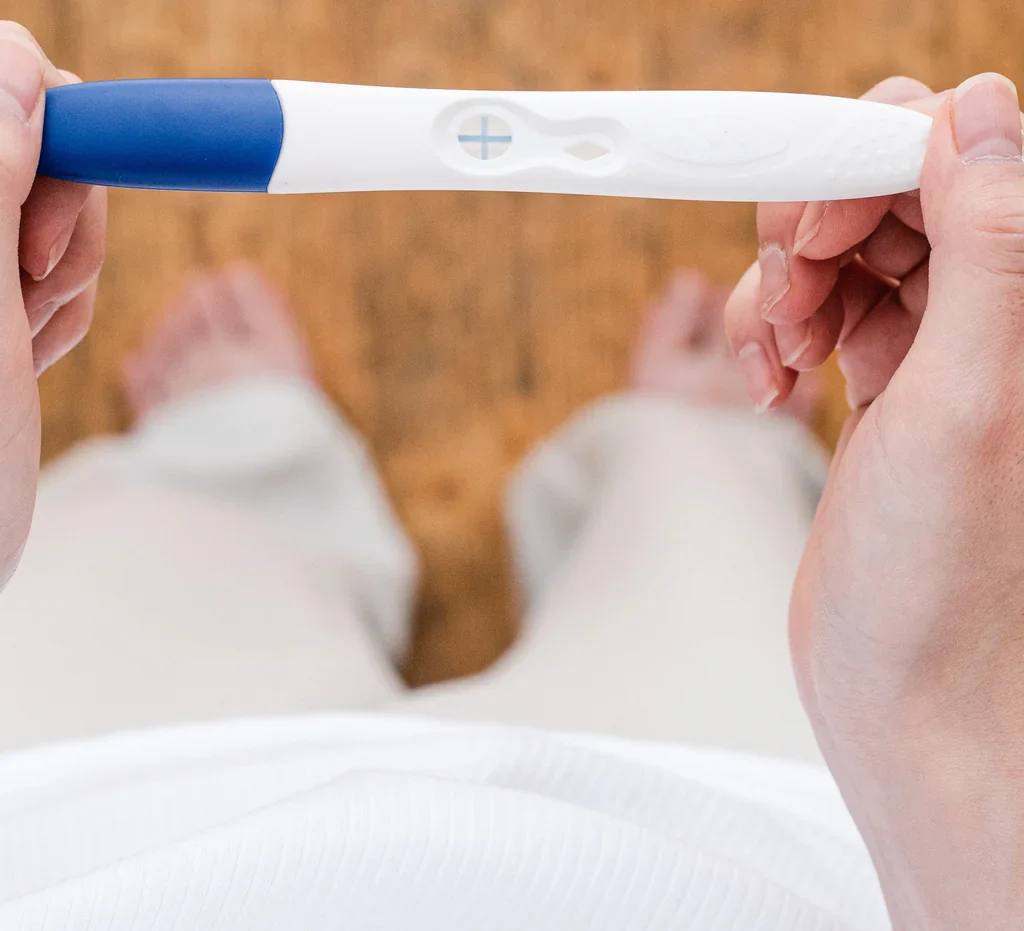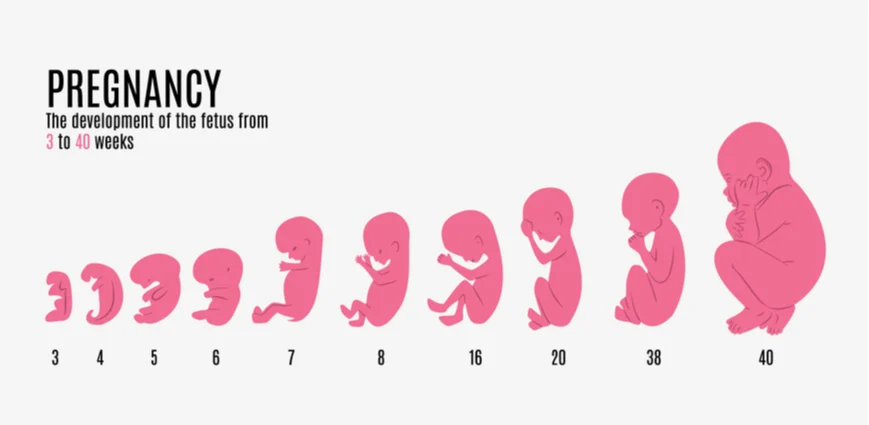The journey of pregnancy comes with a variety of symptoms that differ from one woman to another. This guide will walk you through the pregnancy symptoms week by week, providing insights into what to expect at each stage. Identifying early pregnancy symptoms before a missed period can be particularly challenging, as they are often subtle and easily mistaken for premenstrual symptoms
Recognizing these early signs of pregnancy can make a significant difference in your pregnancy experience. Additionally, staying hydrated in pregnancy is crucial for the health of both the mother and the baby.

Pregnancy Symptoms Week by Week:
As the pregnancy progresses, symptoms change week by week. Here’s a detailed look at what to expect pregnancy symptoms week by week

Week 1 Pregnancy Symptoms:
In the first week of pregnancy, symptoms are often mild and can include:
- Spotting and Cramping: Light bleeding and cramping can occur as the fertilized egg implants in the uterus.
- Bloating: Hormonal changes can cause a feeling of fullness or bloating.
- Mood Swings: Emotional fluctuations due to hormonal changes are common.
Pregnancy Symptoms 2 weeks after period:
At two weeks after your period, it’s possible to experience early pregnancy symptoms if conception has occurred. Some of these early signs include:
- Implantation Bleeding: Light spotting or bleeding can occur when the fertilized egg attaches to the uterine lining.
- Mild Cramping: You might feel slight cramps as the embryo implants in the uterus.
- Fatigue: Hormonal changes can lead to feelings of tiredness and exhaustion.
- Breast Tenderness: Hormones can make your breasts feel sore, swollen, or more sensitive than usual.
- Nausea: Some women may begin to experience morning sickness, although this is more common a bit later.
- Increased Sense of Smell: Heightened sensitivity to odors can be an early sign of pregnancy.
Pregnancy Symptoms Week 3:
By the third week of pregnancy, you may notice:
- Increased Sense of Smell: Heightened sensitivity to smells can make certain odors more pronounced.
- Food Aversions: You might start to dislike foods you previously enjoyed.
- Mood Swings: Hormonal changes continue to affect your mood.
pregnancy symptoms 4 weeks after conception:
- Missed period: This is often one of the first indications of pregnancy.
- Breast tenderness: Your breasts may feel fuller or more sensitive.
- Fatigue: You might feel more tired than usual.
- Slight spotting: Some women experience implantation bleeding, which can be mistaken for a light period.
It’s important to remember that these symptoms can also be caused by other factors, so a pregnancy test is the most reliable way to confirm if you’re pregnant.
Pregnancy 5 Weeks Symptoms:
At 5 weeks, common symptoms include:
- Morning Sickness: Nausea, often in the morning, is a typical symptom.
- Fatigue: Increased tiredness due to hormonal changes.
- Frequent Urination: The need to urinate more often continues as the pregnancy hormone hCG increases.
Pregnancy Symptoms 6 Weeks:
By week 6, the following symptoms may become more pronounced:
- Nausea: Morning sickness can intensify.
- Headaches: Hormonal changes and increased blood volume can cause headaches.
- Bloating: Your abdomen may start to feel more bloated.
Pregnancy Symptoms 7 Weeks:
- You can feel Breast tenderness,
- fatigue
- nausea
Pregnancy Symptoms 8 Weeks:
At 8 weeks, typical symptoms include:
- Breast Tenderness: Your breasts may feel sore and swollen.
- Fatigue: Ongoing tiredness due to increased hormone levels.
- Morning Sickness: Nausea and vomiting may continue or worsen.
Pregnancy Symptoms Week 9:
- Nausea
- vomiting
- mood swings
- heartburn
Pregnancy Symptoms Week 10:
- Less frequent nausea
- visible veins
- slight abdominal cramps
Pregnancy Symptoms Week 11:
- Increased energy
- less nausea
- bloating.
Pregnancy Symptoms Week 12:
- Reduced nausea
- increased appetite
- headaches.
Pregnancy Symptoms Week 13:
- Reduced fatigue
- visible baby bump
- less nausea.
Pregnancy Symptoms Week 14:
- Increased energy
- occasional headaches
- nasal congestion.
Pregnancy Symptoms Week 15:
- Increased appetite
- more noticeable bump
- vivid dreams.
Pregnancy Symptoms Week 16:
- Back pain
- feeling baby movements
- glowing skin.
Pregnancy Symptoms Week 17:
- Shortness of breath
- heartburn
- leg cramps.
Pregnancy Symptoms Week 18:
- Increased appetite
- backaches
- occasional dizziness.
Pregnancy Symptoms Week 19:
- Round ligament pain
- skin changes
- feeling baby movements.
Pregnancy Symptoms 20 Weeks:
At 20 weeks, you might experience:
- More Energy: Many women feel more energetic during this stage.
- Baby Movements: You may start to feel your baby moving.
- Stretch Marks: Skin stretching can cause marks to appear on your abdomen, breasts, and thighs.
Pregnancy Symptoms Week 21:
- Swollen feet
- leg cramps
- back pain
Pregnancy Symptoms Week 22:
- Increased appetite
- stretch marks,
- varicose veins.
Pregnancy Symptoms Week 23:
- Swollen feet
- Braxton Hicks contractions
- back pain
Pregnancy Symptoms Week 24:
- Shortness of breath
- back pain
- Braxton Hicks contractions.
Pregnancy Symptoms Week 25:
- Frequent urination
- constipation
- hemorrhoids.
Pregnancy Symptoms Week 26:
- Insomnia
- Braxton Hicks contractions
- pelvic pain.
Pregnancy Symptoms Week 27:
- Heartburn
- back pain
- shortness of breath
Pregnancy Symptoms Week 28:
- Swelling,
- restless legs
- fatigue
Pregnancy Symptoms Week 29:
- Shortness of breath
- heartburn,
- Braxton Hicks contractions.
Pregnancy Symptoms 30 Weeks:
At 30 weeks, you may notice:
- Heartburn: The baby pressing on your stomach can cause acid reflux.
- Difficulty Sleeping: Finding a comfortable sleeping position can be challenging.
- Baby Movements: The baby’s movements may become more noticeable and frequent.
Pregnancy Symptoms 31 Weeks:
- Swelling
- back pain
- shortness of breath.
Pregnancy Symptoms 32 Weeks:
- Increased Discomfort: Backache, pelvic pain, and round ligament pain might intensify as your body prepares for labor.
- Shortness of Breath: As your baby grows, your lungs have less space, making breathing more difficult.
- Swelling: Ankles, feet, and hands might become swollen due to increased fluid retention.
- Braxton Hicks Contractions: These practice contractions become more frequent and stronger
- Difficulty Sleeping: Finding a comfortable position to sleep can be challenging.
Pregnancy Symptoms at 33 Weeks:
- Strong Fetal Movement: You’ll likely feel your baby moving more vigorously.
- Varicose Veins: These might become more prominent due to increased blood volume.
- Clumsiness: Your growing belly can affect your balance and coordination.
- Shortness of Breath: This continues to be a common complaint.
- Heartburn: Acid reflux can worsen as your baby puts pressure on your stomach.
Pregnancy Symptoms at 34 Weeks:
- Baby Dropping: Some women experience the baby dropping into the pelvis, relieving pressure on the lungs but increasing pelvic discomfort.
- Increased Vaginal Discharge: This is normal but contact your doctor if it’s unusual in color or consistency.
- Nest Building: Many women experience a burst of energy and a desire to prepare for the baby’s arrival.
- Anxiety: It’s natural to feel anxious as your due date approaches.
Pregnancy Symptoms Week 35:
- Pelvic pressure
- difficulty sleeping
- swelling.
Pregnancy Symptoms Week 36:
- Frequent urination
- back pain
- Braxton Hicks contractions.
Pregnancy Symptoms 37 Weeks:
By 37 weeks, many women experience:
- Pelvic Pressure: The baby moving lower into the pelvis can cause pressure.
- Frequent Urination: The baby’s head pressing on the bladder can increase the need to urinate.
- Increased Vaginal Discharge: Your body prepares for labor with increased discharge.
Pregnancy Symptoms Week 38:
- Frequent urination
- pelvic pressure
- Braxton Hicks contractions.
Pregnancy Symptoms Week 39:
- Increased pelvic pressure
- frequent urination
- Braxton Hicks contractions.
Pregnancy Symptoms Week 40:
- Pelvic pressure
- back pain
- frequent urination.
Early Pregnancy Symptoms Before a Missed Period:
Pregnancy symptoms before a missed period can be subtle and easily mistaken for premenstrual symptoms. Some of the earliest signs include:
- Fatigue: Increased levels of progesterone can make you feel more tired than usual.
- Nausea: Often referred to as morning sickness, this can start as early as two weeks after conception.
- Tender Breasts: Hormonal changes can make your breasts sensitive or sore.
- Frequent Urination: The body increases blood flow to the kidneys, which may cause you to urinate more frequently.
Nourishing your body with a balanced diet is crucial during pregnancy. Consuming a variety of nutrient-rich foods naturally supports both you and your developing baby’s health.

Conclusion:
Understanding the journey of pregnancy, and pregnancy symptoms week by week, empowers expectant mothers to navigate this special time with confidence and knowledge. While every woman’s experience is unique, recognizing common symptoms can help manage expectations and address any concerns promptly. Remember, regular prenatal care is essential for a healthy pregnancy and the well-being of both mother and baby.
FAQS:
How do I know if I’m pregnant without a test?
While there are potential early signs of pregnancy, the only definitive way to confirm is with a pregnancy test. However, some common early symptoms include missed period, breast tenderness, fatigue, and nausea
When do pregnancy symptoms week by week start?
Pregnancy symptoms can start as early as a week after conception, but they often become noticeable around the time of a missed period.
How early can you tell if you are pregnant?
Some women may experience early symptoms like implantation bleeding or breast tenderness even before a missed period. However, a pregnancy test is usually the most reliable way to confirm early on.
What are 10 signs that you are pregnant?
Missed period, Breast tenderness, Fatigue, Nausea, Frequent urination, Food aversions, Implantation bleeding, Basal body temperature elevation, Mood swings, Increased sense of smell.
When do pregnancy symptoms start?
Symptoms can begin as early as 5 weeks into pregnancy or a week after a missed period.
What are the most common early pregnancy symptoms week by week?
Nausea, breast tenderness, increased urination, and fatigue.
Why do I feel so tired during pregnancy?
Increased progesterone levels, decreased blood pressure, and blood sugar changes contribute to fatigue.
What are some other common pregnancy symptoms week by week?
Constipation, mood changes, heartburn, fetal movement, and contractions.
When should I contact my doctor about pregnancy symptoms?
Contact your doctor if you experience vaginal bleeding, decreased fetal movement, severe stomach pain, persistent headaches, or vision changes.
How can I track pregnancy symptoms week by week?
Keeping a pregnancy journal or using a pregnancy tracking app can help you monitor pregnancy symptoms week by week. These tools can provide insights into what to expect and when to consult your healthcare provider.
Are pregnancy symptoms week by week the same for every woman?
No, pregnancy symptoms week by week can differ greatly among women. Some may experience severe symptoms, while others have mild or no symptoms. Each pregnancy is unique.
Can monitoring pregnancy symptoms week by week help identify any issues?
Yes, tracking pregnancy symptoms week by week can help you recognize any unusual changes or potential issues early on. If you notice any concerning symptoms, it’s important to consult your healthcare provider promptly.
External Resources:
American Pregnancy Association

Empowering parents to raise happy, confident kids. Get practical parenting tips and advice on our blog, Smart Parent Guides.
